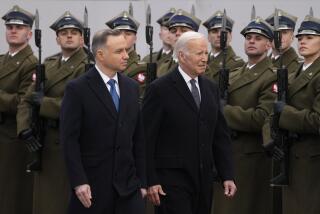Bush Weighs Easing Limits on Tech Exports to East Bloc
- Share via
WASHINGTON — The Bush Administration is considering a gradual easing of restrictions on the sale of sophisticated technology to Eastern Bloc countries in response to the fast-changing political situation there.
Senior Administration officials are pressing for a quick White House decision ordering a step-by-step lifting of restraints on sales of computers and telecommunications equipment to Poland and Hungary, with provisions for widening the list to include other goods and other East Bloc countries if that works out.
The move could come as early as next month.
The push comes partly in response to requests by the two countries for increased access to Western technology and partly to meet demands from West European countries that Washington relax multilateral rules for exporting high-technology products to the Eastern Bloc.
Some Administration strategists worry that if the United States does not move quickly, particularly with regard to Poland and Hungary, Western European countries may disregard longstanding rules among the Allies and begin making such sales. In the process, U.S. firms would lose a potential market.
Deputy Secretary of State Lawrence S. Eagleburger, flatly predicting a “significant change” in U.S. policy in this area, forecast that within six months the Administration would eliminate requirements for prior approval of sensitive exports between Western countries.
He also said the United States and other Western countries would relax their policies to “signal our . . . willingness to respond constructively” to the political liberalization going on in Eastern Europe.
But it is not clear how far the Administration is willing to go. Although the Commerce Department is pressing vigorously for reform of the current regulations, the Defense Department and some other agencies are taking a more cautious view.
Earlier this year, Defense Secretary Dick Cheney publicly protested a Commerce Department decision to lift restrictions on the sale of certain personal computers to the Soviet Union.
Although Cheney has said since that he has changed his mind and now supports that move, the Pentagon is generally more wary about liberalizing export restrictions for fear of inadvertently helping the Soviets militarily.
But Commerce Secretary Robert A. Mosbacher is pressing for a relaxation of some current restrictions, arguing that West Germany and other Western European countries will sell the equipment to the East Bloc countries if the United States does not ease the rules.
Mosbacher wants the United States to lift restrictions on switching gear and other telecommunications equipment needed by Poland and Hungary and then to broaden the list of approved items if the two countries adhere to guidelines for its use.
Under Mosbacher’s proposal, Washington would insist that the two countries set up procedures for safeguarding the security of any new technology--both by limiting the purposes for which the products are used and by on-site inspection to guard against any violations.
In cases where U.S. firms operate joint ventures in Poland or Hungary, the American companies themselves would be asked to help enforce the restrictions. And U.S. officials would visit both countries on occasion to verify that the Western guidelines are being met.
U.S. officials say the Administration’s first challenge will be to reach a consensus internally about what kind of technology Washington is willing to sell to countries such as Poland, Hungary and, eventually, Czechoslovakia. That debate already is under way.
Once the Administration comes to a decision, the next job will be to sell the plan to U.S. allies under the aegis of the Paris-based Coordinating Committee on Multilateral Export Controls.
The 17-country compact, known informally as Cocom, has been regulating Western technology exports since the late 1940s. The Administration had been moving slowly to pare Cocom restrictions, but events in Eastern Europe have overtaken that pace.
Officials here say that for the moment, at least, any relaxation of current rules is likely to affect only Poland and Hungary--not the Soviet Union or other East Bloc countries.
Earlier plans to continue easing restrictions on exports of sensitive technology to China--put into motion during the days when Beijing started to liberalize--have been shelved in the wake of the repression there last summer.
Mosbacher has been arguing for months that it is futile for the United States to demand a continuation of restrictions on exports of lower-technology computers and other equipment when East Bloc countries can easily buy them from European countries, Taiwan or South Korea.
Congress has also taken that view and is expected to go along with the Administration’s new approach.
More to Read
Get the L.A. Times Politics newsletter
Deeply reported insights into legislation, politics and policy from Sacramento, Washington and beyond. In your inbox twice per week.
You may occasionally receive promotional content from the Los Angeles Times.










